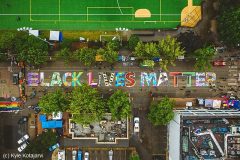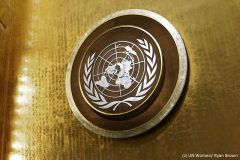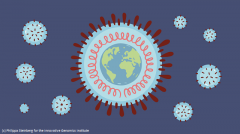Newsletter E-CONNECT No.32 is out
June 25, 2020
On the 24th of June, we released our new issue of E-CONNECT. If you have not subscribed to our newsletter, you can do it from here! Back number is also available.
![]()
Feature story
UN Human Rights Council addressed systemic racism and police brutality against people of African descent
 The Human Rights Council held the urgent debate in response to the police killing of George Floyd in the United States and protests around the world. Prior to the debate, a joint statement by 47 UN experts and a statement by the UN Committee on the Elimination of Racial Discrimination (CERD) were issued concerning the situation of the United States. Following the debate, the Council adopted a resolution to request the High Commissioner to prepare a report on systemic racism, human rights violations against Africans and people of African descent by law enforcement agencies as well as to provide oral updates on the issue of police brutality. IMADR delivered a statement at the debate and expressed support for independent international investigations into structural racism in law enforcement and related human rights violations in the United States. More >>
The Human Rights Council held the urgent debate in response to the police killing of George Floyd in the United States and protests around the world. Prior to the debate, a joint statement by 47 UN experts and a statement by the UN Committee on the Elimination of Racial Discrimination (CERD) were issued concerning the situation of the United States. Following the debate, the Council adopted a resolution to request the High Commissioner to prepare a report on systemic racism, human rights violations against Africans and people of African descent by law enforcement agencies as well as to provide oral updates on the issue of police brutality. IMADR delivered a statement at the debate and expressed support for independent international investigations into structural racism in law enforcement and related human rights violations in the United States. More >>
Civil society calls for non-discriminatory provision of emergency reliefs to students in Japan
 In May, the Ministry of Education of Japan established the scheme of the Emergency Cash Handouts to Support Students for their “continuous learning”, which aims to grant cash benefits to students in higher education who face financial difficulties as a result of the COVID-19 pandemic. Since the criteria and scope of the scheme would exclude international students and students attending Korea University, many of them belonging to the Korean minority, civil society organisations in Japan have requested for the removal of the discriminatory criteria in order to ensure all students’ enjoyment of the right to education. More >>
In May, the Ministry of Education of Japan established the scheme of the Emergency Cash Handouts to Support Students for their “continuous learning”, which aims to grant cash benefits to students in higher education who face financial difficulties as a result of the COVID-19 pandemic. Since the criteria and scope of the scheme would exclude international students and students attending Korea University, many of them belonging to the Korean minority, civil society organisations in Japan have requested for the removal of the discriminatory criteria in order to ensure all students’ enjoyment of the right to education. More >>
UN human rights treaty bodies must continue to monitor States during the COVID-19 crisis
 In early June, the Chairs and members of the human rights treaty bodies met online to discuss their work in relation to COVID-19 and the 2020 review of the treaty body system. TB-Net (NGO Network on UN Treaty Bodies), which IMADR is a founding member, participated in the informal meeting to share inputs from civil society perspectives. TB-Net urged the treaty bodies to remind States of their human rights obligations during the crisis, incorporate questions specific to the pandemic in the States’ reporting processes, and ensure that online working methods enhance the engagement with civil society. More >>
In early June, the Chairs and members of the human rights treaty bodies met online to discuss their work in relation to COVID-19 and the 2020 review of the treaty body system. TB-Net (NGO Network on UN Treaty Bodies), which IMADR is a founding member, participated in the informal meeting to share inputs from civil society perspectives. TB-Net urged the treaty bodies to remind States of their human rights obligations during the crisis, incorporate questions specific to the pandemic in the States’ reporting processes, and ensure that online working methods enhance the engagement with civil society. More >>
IMADR in the world
 Call for written contributions: the state of the UN human rights treaty body system
Call for written contributions: the state of the UN human rights treaty body system
The co-facilitators for the review of the UN human rights treaty body system, Switzerland and Morocco, opened the call for written contributions regarding the review process, with 18 guiding questions. Deadline for submissions is 7 July 2020. More >>
IMADR and its concerns
 COVID-19 pandemic, racism and discrimination
COVID-19 pandemic, racism and discrimination
At the resumed 43rd session of the UN Human Rights Council, IMADR raised concerns on racial discrimination and inequalities during the pandemic. IMADR called on States to take concrete steps to close the gap in the implementation of the Durban Declaration and Programme of Action (DDPA), and strengthen their support to the UN human rights mechanisms. More >>
IMADR at the UN
 CERD holds 101st session online
CERD holds 101st session online
UN Committee on the Elimination of Racial Discrimination (CERD) will hold its 101st session online. The Committee postponed the country reviews of Bahrain, Belgium, Bolivia, Denmark, France, Niger, Singapore and Thailand. More >>
Publication
 Submission: COVID-19 and the rise of nationalist and religious extremism in Sri Lanka
Submission: COVID-19 and the rise of nationalist and religious extremism in Sri Lanka
In response to the call for submissions for her thematic report to the General Assembly on the rise of anti-Semitism and other forms of racism in times of COVID-19, IMADR submitted the information to the UN Special Rapporteur on racism, focusing on the rise of nationalist and religious extremism in Sri Lanka and discrimination against ethno-religious minorities, in particular Muslims. More >>
Related Content

Newsletter E-CONNECT No.40 is out

Newsletter E-CONNECT No.39 is out

Newsletter E-CONNECT No.38 is out


